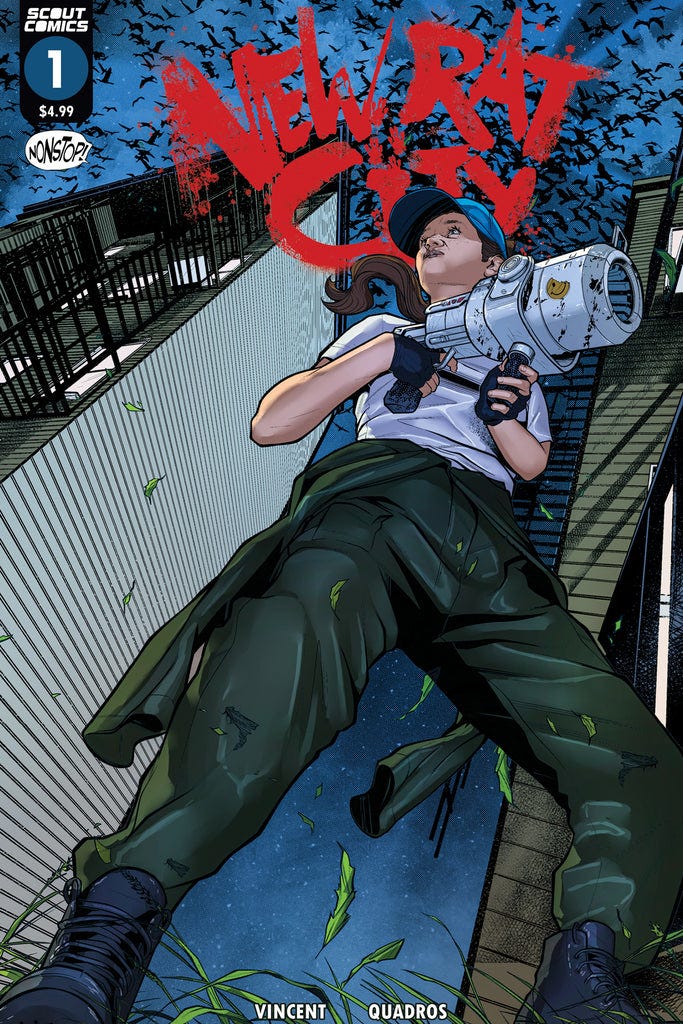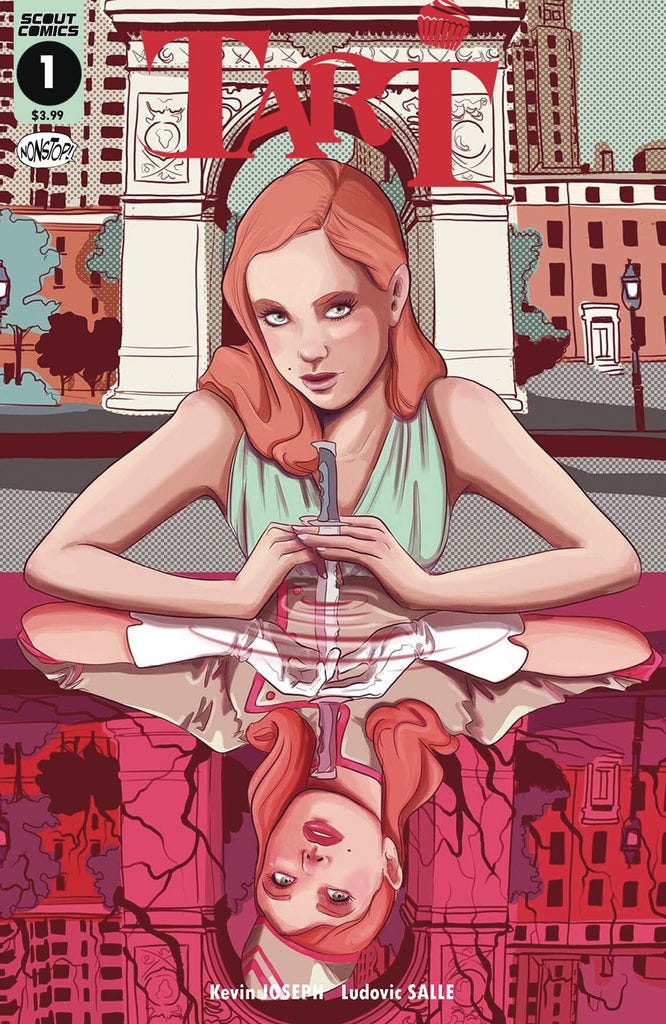My Ghost of Comics Future tells young me what’s up
Every once in a while someone reaches out to ask me how to get started writing comic books. After spending much longer than I meant to on one of these inquiries recently I realized I’d written a pretty good blog post. I wish past me circa 2013 had had such words of wisdom (and warning). I’ve adapted my recent answers so we have present me telling past me what he was getting into. I hope it helps another aspiring writer out there to tackle the world of comics.

Hello Young Colin,
Welcome to the start of your comics journey, should you choose to embark. That’s not a small decision. Do it wrong and you can be looking at financial loss and emotional ruin. Do it right and you can be looking at…financial loss and artistic fulfillment.Hey, your Ghost of Comics Future has seen some things since 2013.
I’ll start with good news. Making a comic book is super fun. It’s a great way to tell a story. The comics medium lets you play with time and space in powerful ways. The mechanics of comics are limiting but liberating at the same time, and if you fall in love with comics writing it can be hard to see a blank page the same way again. It’s a massive thrill to see your words turned into full color pages of art, printed and shipped to people all over the world. There is a global comics making community that can be supportive and inspiring. There are talented artists all over the world who want to make your comic book, and you can find them with just a few clicks. With advances in digital platforms and printing technology, it has never been easier to make a comic and release it without ever bothering with the gatekeepers of traditional publishing. If you have a comics idea in your head, you CAN make it real.
Hey, your Ghost of Comics Future has seen some things since 2013.
Now some bad news. Making a comic book is damn hard. There is a huge amount to learn. It will cost you money and countless unpaid hours of work. It will be slow and frustrating. As a writer in a visual medium, you will always be beholden to a team of artists, and their myriad personalities, to make your dreams a reality. Your final product will be your artists’ interpretation of your ideas, which can be hard for a writer to accept. When you depend on other people, you are vulnerable to all the problems that can happen to person; now multiply all those problems by the number of people on your team and be prepared to get derailed. You could work with an artist for months or years only to have them back out of your project.
To make your books and find an audience you will have three basic choices. 1) Pay thousands of dollars out of pocket to the artists to make the book, print it and then find an audience for it. 2) Face the unforgiving world of publishers big and small who may or may not pay you, may or may not actually print and distribute your book, but will likely want the rights to your intellectual property. 3) Enter the crowdfunding world to raise money and find audience, which is great except for the whole new learning curve and huge amount of work it requires. (Even if you successfully go down the traditional publisher route, these days the publisher may STILL require you to crowdfund your production.) Thought you were just an introverted writer typing a story on your laptop? Wrong, now you’re a salesperson pounding the digital pavement to drum up support from strangers through pitches, blogs, social media, podcasts, press releases and, god forbid, talking to people.
You owe it to yourself to consider any other form of artistic expression before subjecting yourself to the pain of making comics.
A general rule of thumb: you can make a great book with $7000-$10,000 and 8-12 months of work. A quality comic should cost around $200-300 per page for the pencils/inks/colors/letters/editor. (Yes, you can cut corners and do it for much less, but I’m talking about making a top notch book and paying good artists their going rates.) This doesn’t count cover art, book design, printing, shipping, postage, web hosting, software, advertising or any other overhead. It also doesn’t count your time spent writing and managing the project. Pay all that and in a year you could have a pile of say 500 shiny new comic books in your basement. (Hopefully the printer got the pages in the right order, but don’t count on it.) If you’ve done it right it’s a great book that people should want to read, but they won’t know a damn thing about it. How you find readers and get books to them is a whole other question for another blog.
Take all that bad news and think about it. It is fair to say you owe it to yourself to consider any other form of artistic expression before subjecting yourself to the pain of making comics.
If you could be happy with making your story a novel you owe it to yourself to push that novel as far as it can go. I could have written my By the Time I Get to Dallas story five times over as a novel in the time it has taken me to produce two thirds of the comic book series. A novel depends on JUST you and an editor (if you don’t have a publisher, hire your own editor.) You can post your novel in a million places tomorrow and will be alive and in the world. That is a powerful thing. Finding readers for a novel is still hard, but there are far fewer moving parts than with a comic. And the book will be your vision, with no one else required to make your story a reality.
If, however, you absolutely have to see your story as a comic, then proceed.
Between work, family and hobbies I have enough minds melded to mine already, and I’m not sure meeting up is the first most efficient way to get you started. Let me give you a few assignments that will be more useful than talking with me IRL.
- Scott McCloud’s books Understanding Comics and Making Comics are essential. Buy them and read them.
- Read this three-part blog by my friend and amazing comic maker Honor Vincent, it lays out the journey better than I could:https://www.andrastecomic.com/post/what-does-a-comic-cost-part-1-getting-started
- Buy a bunch of indie comics to see what this all means in practice. I happen to know several great urban/dystopian adventure stories off the top off my head, starting with mine!My books I think are pretty damn good. I’d get By the Time I Get to Dallas 1-4 standard edition, or go for the limited edition covers if you’re feeling fancy.

https://Gumroad.Com/Pitdocpress
- Honor Vincent’s New Rat City is right up your alley. She self published this fantastic story but now it is carried by Scout Comics. Honor is an indie comics success story, read everything she writes.
 https://www.scoutcomics.com/collections/new-rat-city
https://www.scoutcomics.com/collections/new-rat-city - David Taylor’s Wild Nature. Great story about reality TV death matches in a dystopian Miami. It is a very well done book. David and I share an editor, Claire Napier. You should find an editor as good as Claire.

https://www.dftaylor.art/store
- Kevin Joseph’s Tart series is about as good an indie comic series as I can think of. Read it to see just how good this medium can be. ? It’s about sexy, time traveling demon fighters—why didn’t I think of that?! Produced through crowdfunding, later picked up by traditional publishing (but still crowdfunding).
 https://www.scoutcomics.com/collections/tart
https://www.scoutcomics.com/collections/tart
(All the above creators can and should be followed on Substack through my recommendations.)
After seeing all that amazing work now you really want to make a comic book, right? Good. Think of an idea for a one-shot comic and try outlining it. DO NOT make adapting a 440 page novel you first comic project, you will never finish it. Think about making a one-shot stand alone book; it can be part of a larger world but make sure it is a self-contained story. Don’t aim for more than 24 pages or so (even smaller, like 8 pages, would be a great first exercise). Think of that story and outline what should be on each page of it (a page break down). The key to comics writing is choosing which moments to give precious page space to, and how to control time to make the story work in such limited space.
Okay, I wrote more than I meant to but I think this is a great primer. If you’re still down for making a comic book then it’s time to let it rip!
Good luck!
Old Colin
PS. Aron Rodgers will join the Jets in 2023. Don’t get excited about it. Trust me.
Colin Devonshire
Colin is an emergency physician in Boston, Massachusetts. The seeds of his comics project were sown when he took a sabbatical from the ER for creative writing. His creative non-fiction has been published in the Journal of the American Medical Association.


